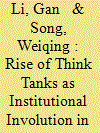| Srl | Item |
| 1 |
ID:
137542


|
|
|
|
|
| Summary/Abstract |
The literal translation of avant-garde from French is ‘foreguard’. While the front has been diversely defined in various permutations of the movement, the cutting edge of avant-garde theatre in China and many post-socialist countries is largely retrospective and anti-futuristic. This is particularly true for the campus-based fringe theatre of the early 1990s, which is regarded as the highlight of avant-garde theatre in China. An alternative venue spearheaded by young theatre artists, avant-garde fringe theatre is notable for unpacking the cultural and political constructs of the Chinese socialist period as it played out through the artists’ own formative experiences. Directed by Meng Jinghu, I Love XXX chronicles the moral emotions that are central to a generation’s self-identity. The play, which is composed of more than 700 parallel sentences prefixed with ‘I love’, presents a meticulously constructed emotional archive of the generation that was born in the late socialist period and came of age in post-socialist China. Imitating rites of passage and classroom drills, the play effectively illuminates the impact affective education had on an individual’s self-perception. The fact that the play was revived in 2013 – 19 years after its initial appearance – proves its enduring relevance in contemporary China.
|
|
|
|
|
|
|
|
|
|
|
|
|
|
|
|
| 2 |
ID:
129800


|
|
|
|
|
| Publication |
2014.
|
| Summary/Abstract |
Since the early 2000s, the Chinese military has been engaged in the production of military- and war-themed cultural products which increasingly employ new media and new technologies. Many of these products specifically target children and youth, and many are also a result of collaborations between the People's Liberation Army (PLA) and commercial forces. This article offers a preliminary exploration of how such PLA-civilian productions attempt to package and market war and the military to contemporary Chinese children and youth. It compares these current endeavours to previous depictions of war and the military in the youth culture of the Maoist period, and reflects on what this comparison can tell us about recent changes in official as well as popular conceptualizations of childhood, youth, and violence in the People's Republic of China. The analysis demonstrates that contemporary PLA products for children and youth display positive attitudes toward the military and toward officially sanctioned military violence. However, these products also subscribe to new public sensitivities about children and their involvement in acts of brutality, thereby reflecting the changing needs and interests of the PLA and of the Chinese Communist Party in the post-Cold War, post-Tiananmen era.
|
|
|
|
|
|
|
|
|
|
|
|
|
|
|
|
| 3 |
ID:
183642


|
|
|
|
|
| Summary/Abstract |
This analytical essay addresses the rise of Chinese think tanks in recent years. Despite their rapid growth, think tanks in China are generally shown to be becoming less effective in their normal functions and increasingly bureaucratic and dysfunctional. This essay adopts the concept of involution as its organizing framework. It argues that due to political and ideological impediments, Chinese think tanks are encumbered by institutional involution, a process of increasing in number and yet becoming more internally complicated. It asserts that the rise of Chinese think tanks provides minor yet telling evidence of involution within China's current governance system. The essay concludes by highlighting that this phenomenon is not unusual, but rather a pervasive and natural outcome of the Chinese post-socialist regime.
|
|
|
|
|
|
|
|
|
|
|
|
|
|
|
|
| 4 |
ID:
163121


|
|
|
|
|
| Summary/Abstract |
This study unpacks the roles of local cultural repertoires and media systems in glocalising the social movement discourse on anti-genetically modified crops in China. The discourse analysis not only demonstrates how residual Maoism legacies are used to produce Mao-style movement discourses, but also reveals how the resulting ideological disjuncture has led the post-socialist media system to criticise, tailor or activate the Maoist movement discourse. This project calls attention to the impact of socialist legacies on shaping social movement discourses in post-socialist China. It also invites us to reflect on the perspective of "essential diffusionism" pervasive in the movement diffusion literature.
|
|
|
|
|
|
|
|
|
|
|
|
|
|
|
|